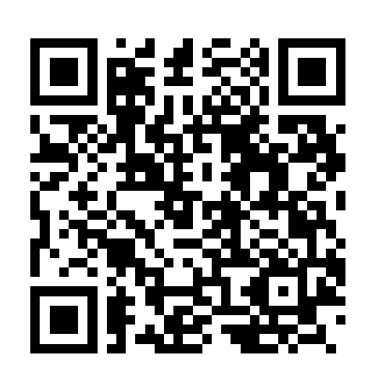Latest Events
The last couple of events organised by the Blue Mountains Peace Collective
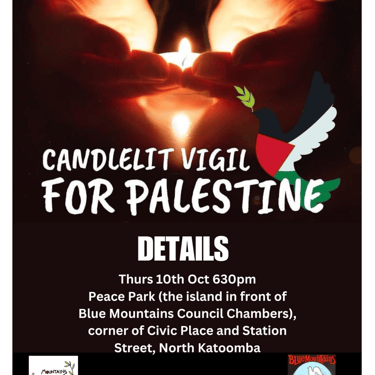
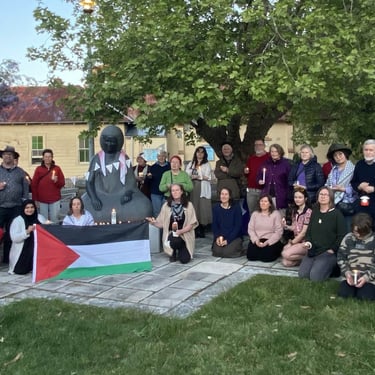
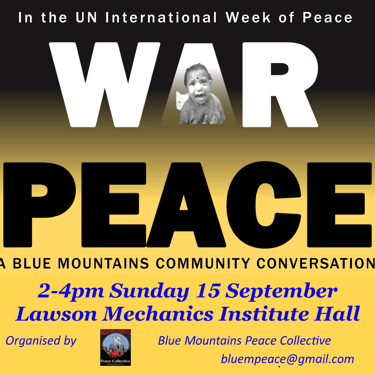
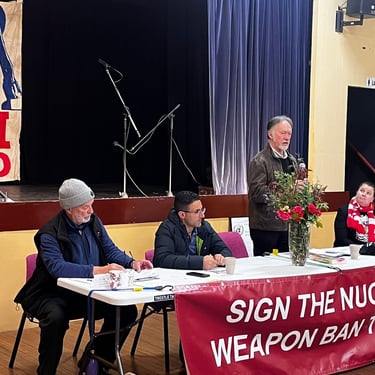
Anzac Day Reflection in Katoomba 25th April 2025
Over 120 people attended the Anzac Day Reflection held during the afternoon of Friday 25th April 2025 in Katoomba’s Peace Park.
This was the first time that such an event has been held in the Blue Mountains.
Organised by the Blue Mountains Peace Collective (BMPC) and facilitated by Jon Atkins, the program included: Welcome to Country, songs by a local choir, a minute’s silence, poetry, a speaker on impact of the Great War.
Among those who attended were local councillors and representatives from Radio Blue Mountains, Blue Mountains Unions & Community, Faith Organisations, Mountains for Palestine, and the Greens.
Peace Sculpture: At the start of the event, reference was made to Tom Coley and his imposing Peace Sculpture which is located in the corner of the Peace Park.
Tom donated the sculpture to the Blue Mountains Council in 2009. He died in December 2018 with no plaque having been attached to the plinth.
As a result of Clr Sarah Redshaw’s notice of motion in November 2023 which was supported by all councillors at the time, council installed a plaque. However, the plaque does not acknowledge Tom as the sculptor since, at the time of donating the sculpture to council, he specifically requested that his name be omitted from the plaque.
Why an Anzac Day Reflection? While we come together on this day to remember Australian casualties during WW1, including the ill-fated Gallipoli campaign, as well as in other wars and conflicts, Anzac Day Reflections have a number of distinctive features.
Jon Atkins from the Blue Mountains Peace Collective (BMPC) summarised these as follows:
• The tributes paid to the victims of WW1 (and other wars) are inclusive. They include Aboriginal servicemen who lost their lives, those who returned maimed and brutalised by war, grieving loved ones and relatives on the homefront, as well those who were vilified and persecuted for opposing war and supporting peace.
• Hard questions being asked about the Gallipoli campaign and other military engagements e.g. (a ) Why did we so readily go to war? (b) What was achieved? and (c) Was engagement in our long term national interest? It was argued that we need to learn from past military tragedies so we can minimise them occurring in the future.
• Rejecting all the “add-ons” that now seem inseparable from Anzac Day commemorations. These include such fictions promoted by the Anzac legend as (a) the nation was born as Gallipoli (b) it was our first blood sacrifice (c) our national identity was established in war time (d) we fought at Gallipoli for freedom and democracy and (e) our national values are military values.
In conclusion, it was stated that “the promotion of the Anzac legend, by distorting our history and discouraging critical inquiry, has helped to suppress public resistance to Australia’s engagement in foreign wars in the service of “great and powerful friends” – in the past, this was British Empire – today, it’s the most belligerent of nations, the USA.”
Welcome to Country: Uncle Chris Tobin, a Dharug elder, provided a Welcome to Country. He said he had increasingly questioned official Anzac Day commemorations. In particular, he noted that the Anzacs were still British subjects, not Australian citizens at the time of the Great War. Rather than fighting for freedom and democracy as claimed by the Anzac legend, what the Anzacs went to die for was King and Empire.
Chris went on to say that Anzac Day commemorations “should be a useful thing for us, so we don’t get carried away.” He noted that “when we acknowledge country in Australia we are dismantling that nationalism that is so destructive around the world.” He added that what we need to do is “to recognise the sacrifice of those brave young souls” who perished at Gallipoli and on the Western Front, but to “do it respectfully … with sadness, not with pride.”
After the Acknowledgement of Country, the Bearded Ladies Community Choir from Katoomba, comprising 25 singers and led by Michael Macken, sang ‘The whole world is dreaming’ by Mark Seymour.
Local poet, Brian Bell, recited one of his own poems called ‘Garden of Peace’.This was followed by Mark Hillis from BMPC who read an extract from an article entitled ‘Anzac Day’ by the historian Henry Reynolds.
In that extract, Henry Reynolds noted that at official Anzac Day commemorations:
“We remember the sacrifice of our war dead (but) we completely ignore the suffering and the death of people of the first nations in the frontier wars which effected the long drawn out conquest of indigenous Australia.
Our national lament is for those who died overseas in wars chosen for us by our great and powerful friends, most of the time against enemies who would never have been able to threaten Australia.
How is that commensurate with frontier wars fought in Australia about the ownership and control of the continent itself? For us this must be of far greater significance than the balance of power in Europe or the scramble to carve up the remains of the Ottoman Empire.”
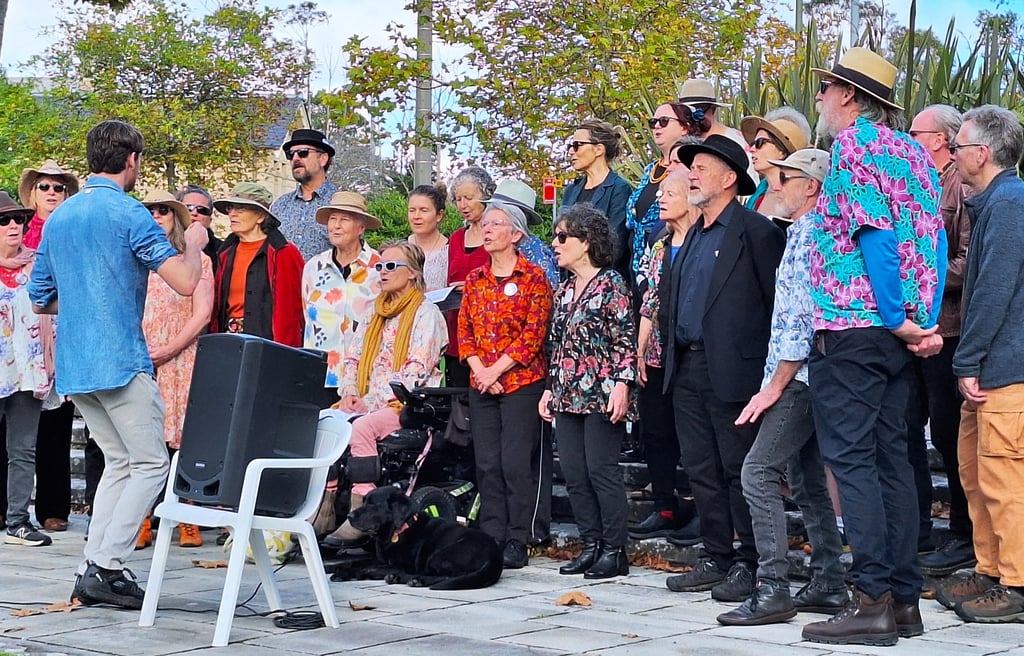

Source: Blue Mountains Peace Collective. Bearded Ladies Community Choir performing at Anzac Day Reflection in Katoomba on 25th April 2025.
3. Support the InternationaI Campaign to Abolish Nuclear Weapons (ICAN) and its campaign for the Albanese government to sign and ratify the UN Treaty on the Prohibition of Nuclear Weapons (also known as Nuclear Weapon Ban Treaty) without further delay.
4. Support the Independent Peaceful Australia Network (IPAN) and its campaign for the Federal government to develop independent foreign and defence policies.
In conclusion, people were urged to support genuine remembrance, not ‘Anzackery’ or celebrations of mythology with political overtones.
In supporting genuine remembrance, the following question was posed:
How can we protect Anzac Day as an occasion devoted to reflection and mourning and prevent it from becoming a political tool or a justification for future bloodbaths?
With election day on the 3rd May looming, it was suggested that:
“The one thing we can do is to elect parliamentary representatives who are committed to independent foreign and defence policies and who demand of the Australian government that it becomes a champion of peace, diplomacy and reconciliation in regional and global forums, including the United Nations.
Being recognised as a champion of peace will help to diminish the country’s obsession with military commemoration and discredit the view that our engagement in foreign wars has been a defining collective experience.”
Following the last speech, Clr Suzanne Jamieson, who was representing Susan Templeman MP at the gathering, was asked to come forward and draw the winning tickets.
The two raffle prizes given out at the event were:
• 1st prize – $50 voucher donated by Gleebooks, Blackheath
• 2nd prize – Douglas Newton’s Private Ryan and the Lost Peace: A Defiant Soldier and the Struggle Against the Great War.
Following a number of announcements, many participants came forward and expressed their support for another Anzac Day Reflection being held in Katoomba next year.
♦ ♦ ♦ ♦ ♦ ♦
After the poetry and reading, a period of one minute’s silence and reflection was observed.
Impact of the Great War: Next, social historian Dr Naomi Parry Duncan spoke about the impact of World War I on Australia’s economy and society.
Prior to the outbreak of the war, Australia was described as a “miracle economy” with world leading education, health and welfare systems at the time.
However, social conditions began to change when Australia got swept up during the enormous mobilisation of military forces prior to the outbreak of the Great War. Subsequently, Australia began to introduce measures such as compulsory military training – vehemently opposed by many – as well as the War Precautions Act 1914 under which many people who opposed war and spoke up for peace were harshly prosecuted.
In an impassioned conclusion, Naomi said:
“What I want to say is down with nationalism, up with collectivism, up with our hearts, our minds and our bodies. There is no just war but series of just fights.
What we need to fight for is our right to organise, to be together, to achieve the peace and the harmony that take us back to something like the paradise that we were before war smashed our economy, killed 62,000 of our people, left 150,000 maimed and a quarter of a million people dependent on government pensions and sucked the life out of our economy.”
More poetry: After Naomi’s speech, local resident, June, recited one of her poems called ‘Lament for Madame Curie’.
The next poem called ‘Weapon’ by Judith Wright was recited by Rowe Morrow from BMPC. Prior to reciting the poem, Rowe referred to the terrible consequences of war, including those she observed when visiting war-torn Vietnam and Cambodia in the mid 1980s.
Building peace : Following the choir’s last songs, Jon Atkins addressed the topic of building peace. With respect to initiatives that could be taken today to advance the cause of peace, the following actions were nominated:
1. Back calls for the official recognition of the Frontier Wars by the Australian War Memorial and the impact they had on Indigenous dispossession.
2. Support the campaign by Australians for War Powers Reform (AWPR) for the democratisation of war powers by the Commonwealth Parliament.
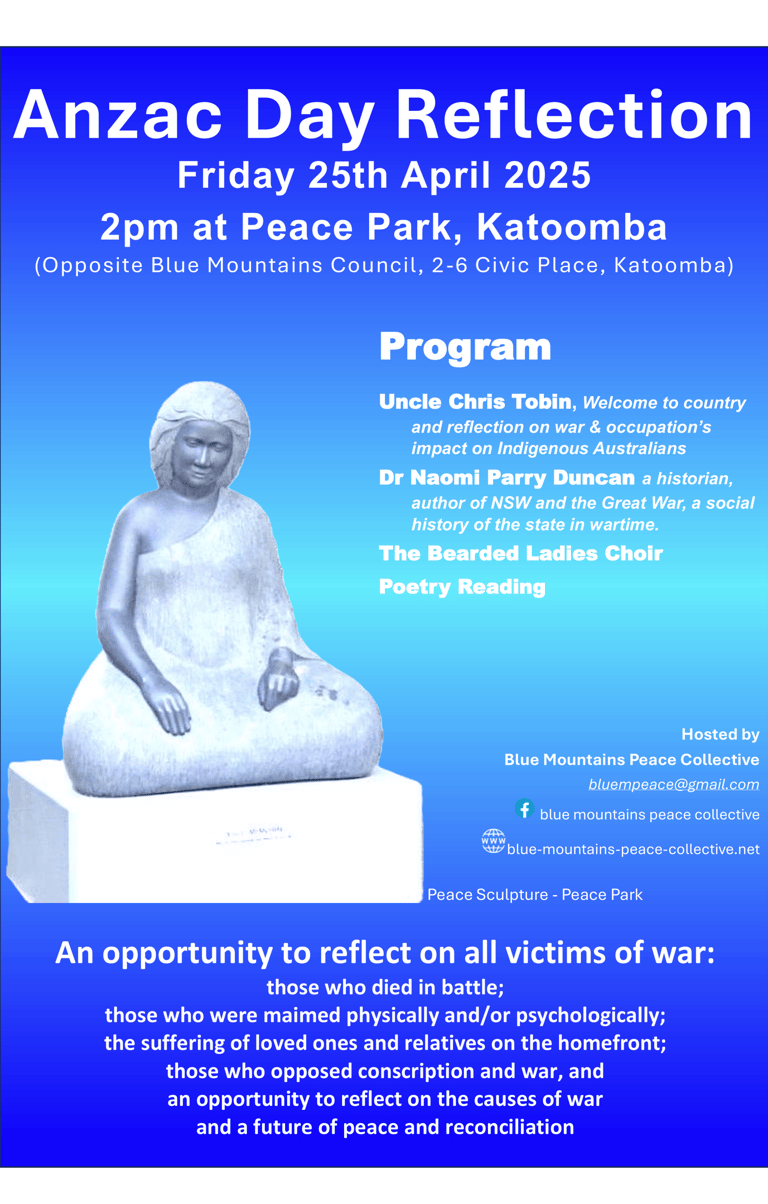

Other Recent Events Against War and AUKUS - for Peace with Justice
Here's a range of the events we've organized in the past revealed through our posters and some pictures. We're working to build better understanding in the Blue Mountains of the growing threat of War, of the huge finances being wasted on Nuke submarines and the threat to Australia's independent foreign policy in AUKUS while being dragged in to a US War with China. We work to mobilise our community to stand up for an independent, peaceful foreign and defence policy.
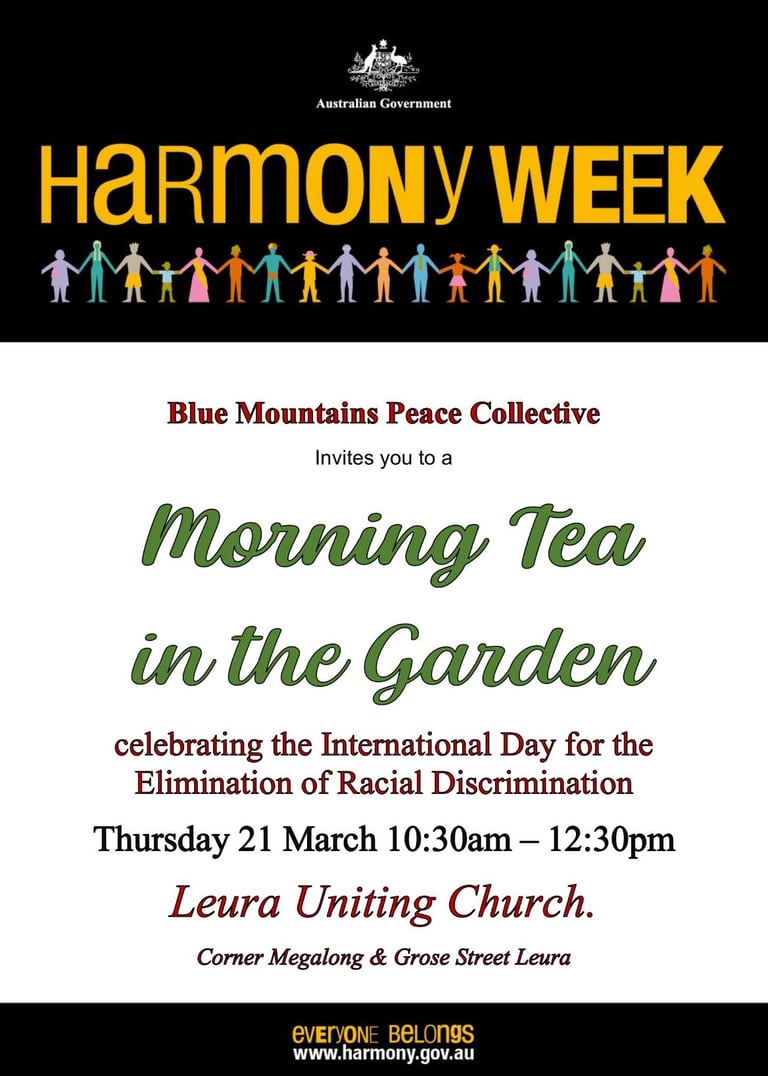

On the UN's International Day for the Elimination of Racial Discrimination, 21 March
The Blue Mountains Peace Collective held a Morning Tea at 10.30am in the Hall at Leura Uniting Church.
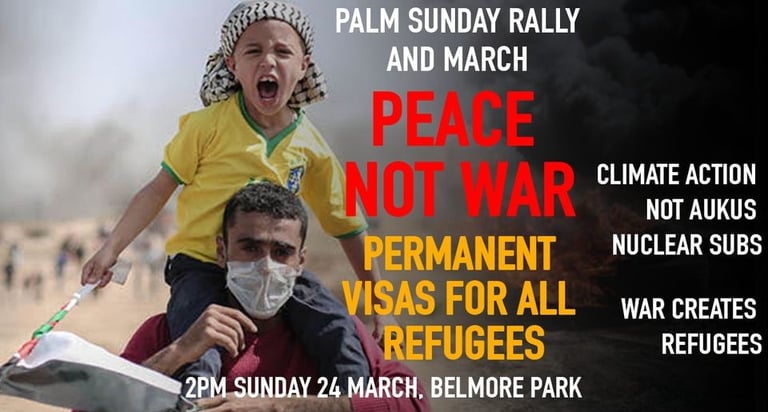

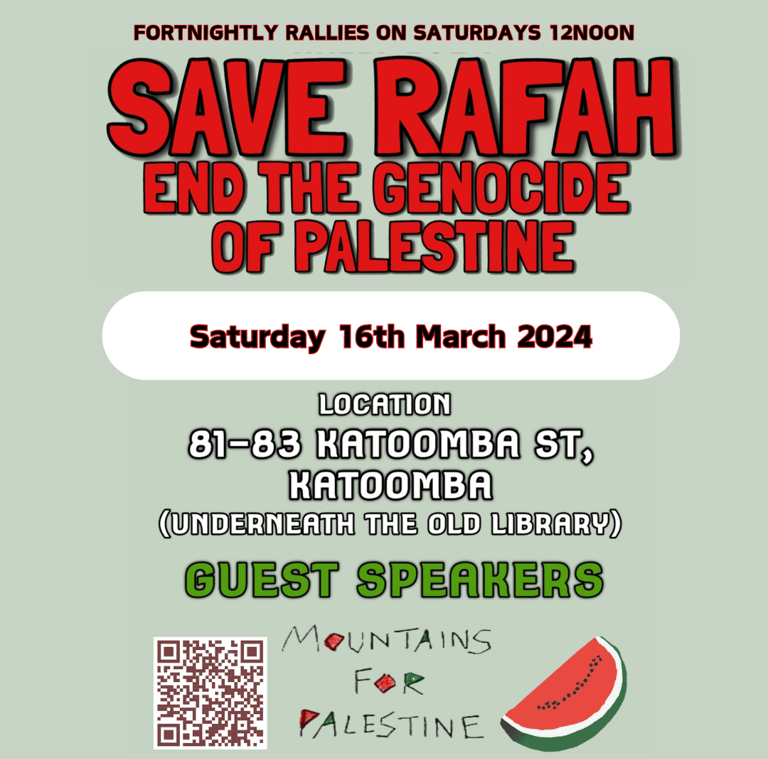

Some of us joined the Blue Mountains Refugee Support Group at the Palm Sunday Rally in March
And at a local Mountains For Palestine Rally to End the Genocide in Palestine
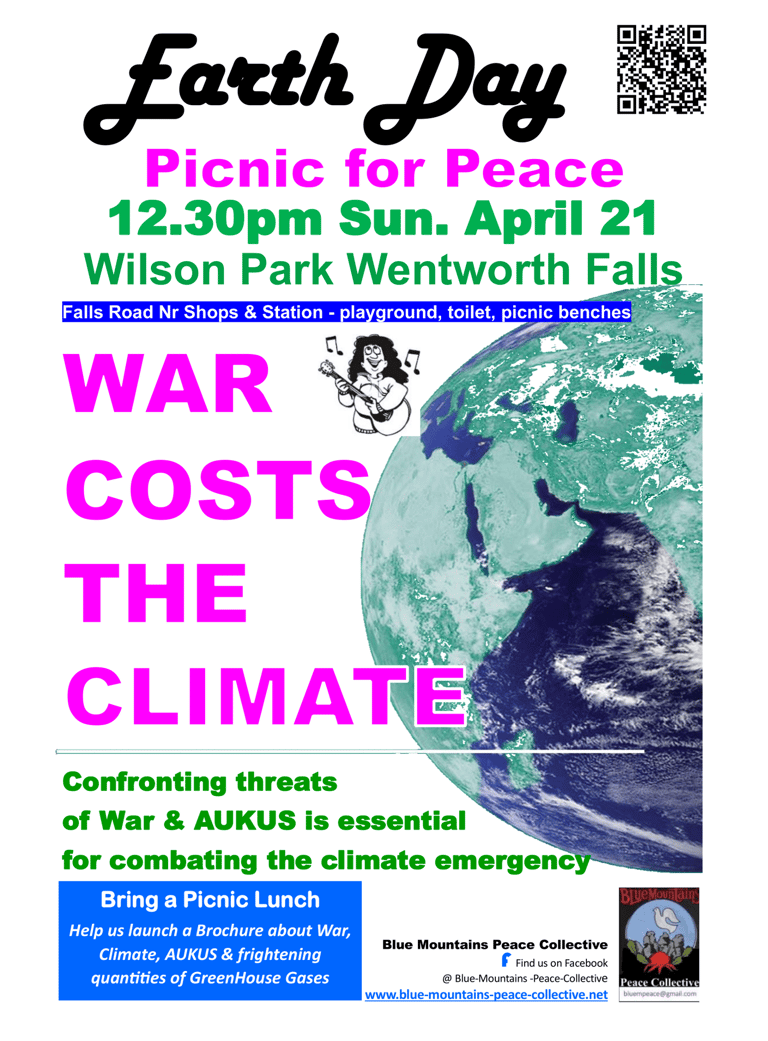

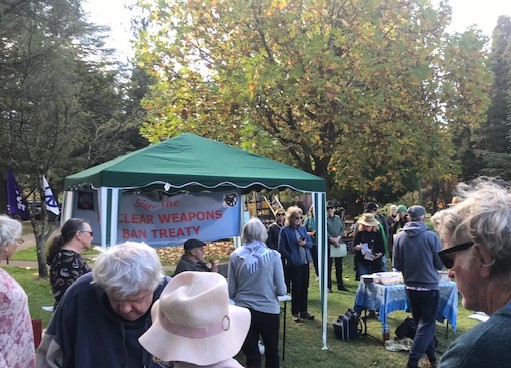
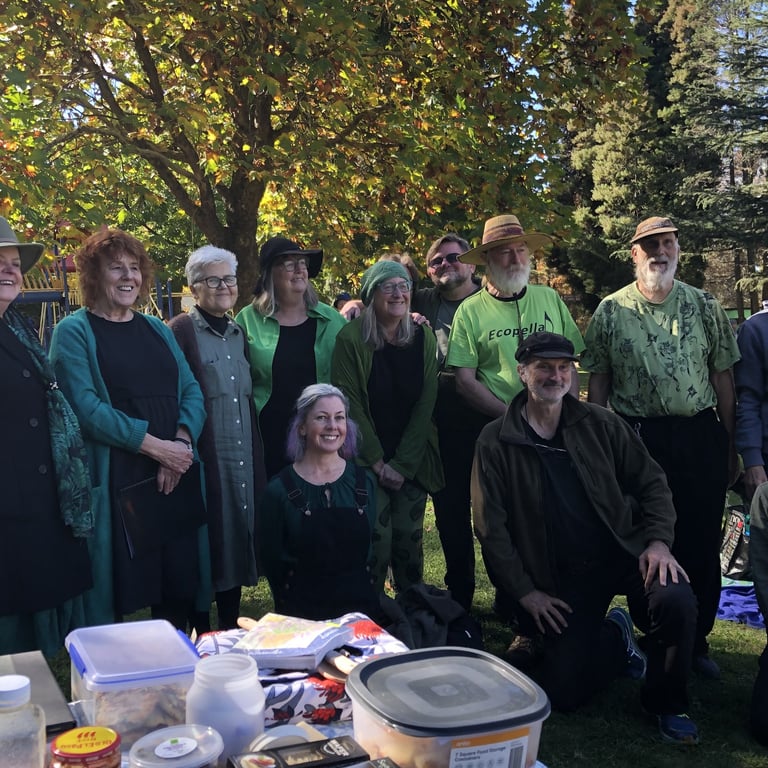
An Earth Day Picnic for Peace organised by Blue Mountains Peace Collective was held on Sunday 21 April at a local Wentworth Falls park.
On a beautiful day about 50 people gathered for a teach-in and to launch a brochure “War Costs the Climate”.
Huge greenhouse gas emissions by the world’s militaries with Australia’s AUKUS partners leading polluters, how militaries emissions are not included in national emission reduction commitments and the intertwined existential threats to humanity and nature of the climate emergency and war between nuclear armed powers and more were topics of the day.
The contrast between the hundreds of billions Australia is spending on an arms race was highlighted against the shortages of funds for the urgently needed emissions reduction race and social assistance in a cost-of-living crisis.
The local Conservation Society and Unions and Community group brought stalls, food, plants and flew banners. The local Ecopella Choir entertained along with a local musician and poet. Numerous people shared relevant issues.
Copies of the brochure were taken for friends, networks and distribution. For copies download @ www.blue-mountains-peace-collective.net or email bluempeace@gmail.com .
Voices of Palestine on 6 July at Leura involved 2 local Palestinian Australians sharing personal tales of their experiences in refugee families in Australia, and their families who remained or returned to Palestine.
Their stories included denial of their heritage, then its reclamation and the troubles endured by family still in Palestine. The personal stories ebbed and flowed between humorous, ironic to emotionally wrenching.
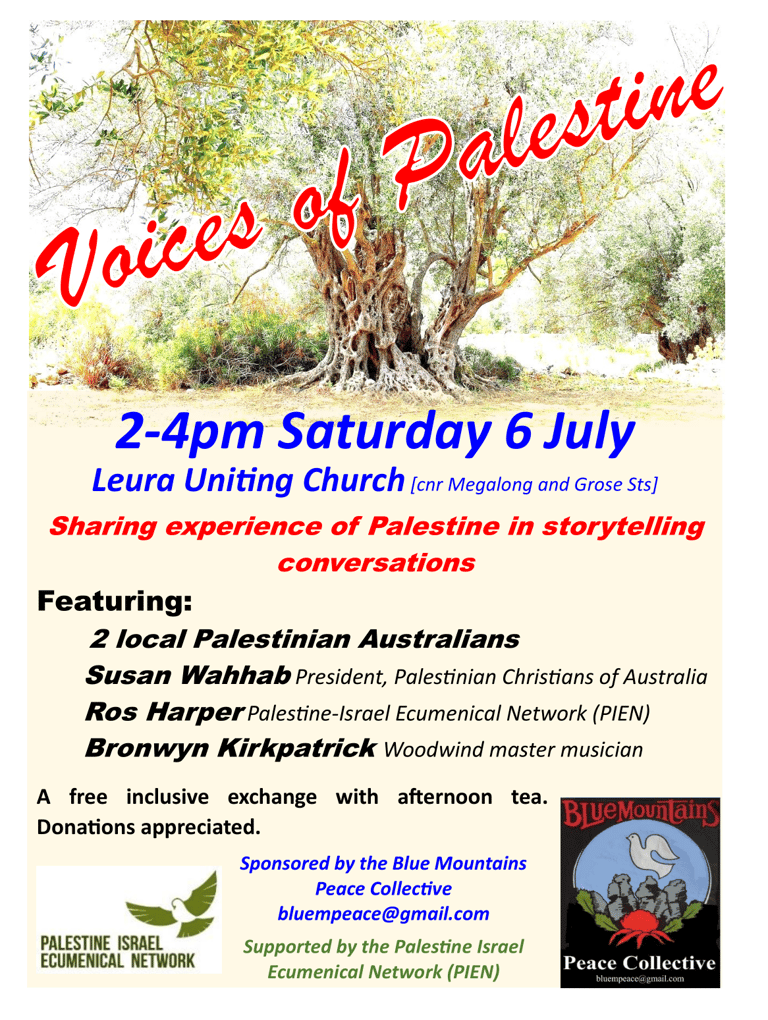

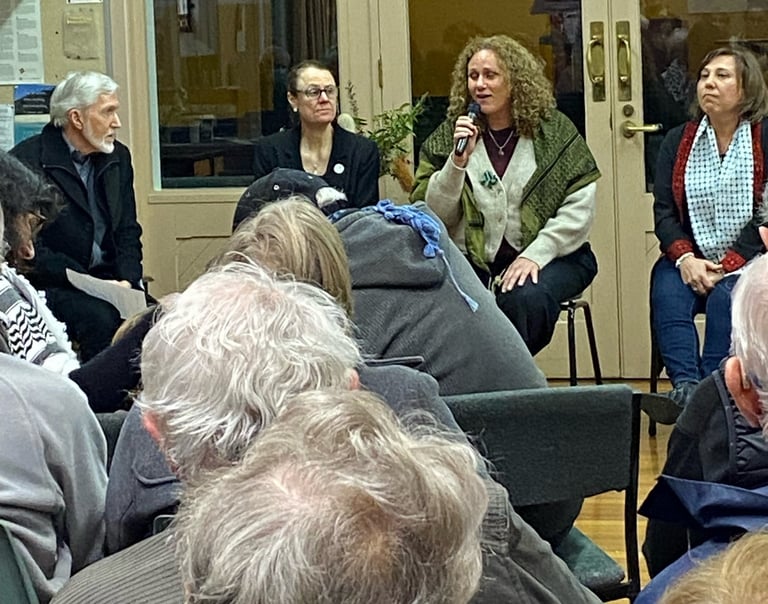

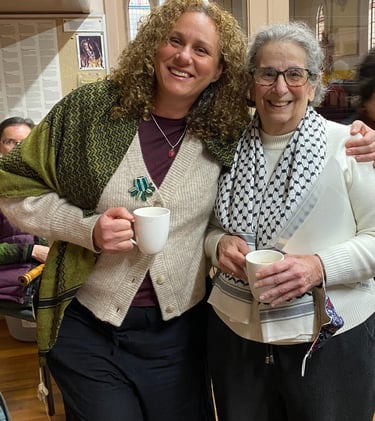

One told of a young school-age relative being dragged from his bed and beaten in the middle of the night by Israeli troops who had broken into their home. He was held without charge, enduring nearly 30 court appearances over 3 years, only being advised of what he was charged with after nearly 2 years. The court hearing were all in hebrew without Arabic translation.
About 50 people attended and also heard from Ros Harper about daily humiliations and beatings, of ever-present, heavily-armed Israeli troops, of multiple checkpoints between homes and shops, schools, workplaces, where Israeli registered vehicles were waved through while Palestinian vehicles were stopped and searched, delayed sometimes for hours, of water and electricity cut-off without notice time and again.
Susan Wahhab spoke of the Palestinian refugees arriving in Australia with nothing but the clothes on their back, with visitor visas and no government support. Susan spoke of work going on to provide support to all refugee families arriving here and efforts to get government support for community efforts to help these refugees.
Donations were collected and provided for that refugee support activity.
Dindy Boutagy and her Aunt Halaam at Voices of Palestine
Saturday 20 July Katoomba
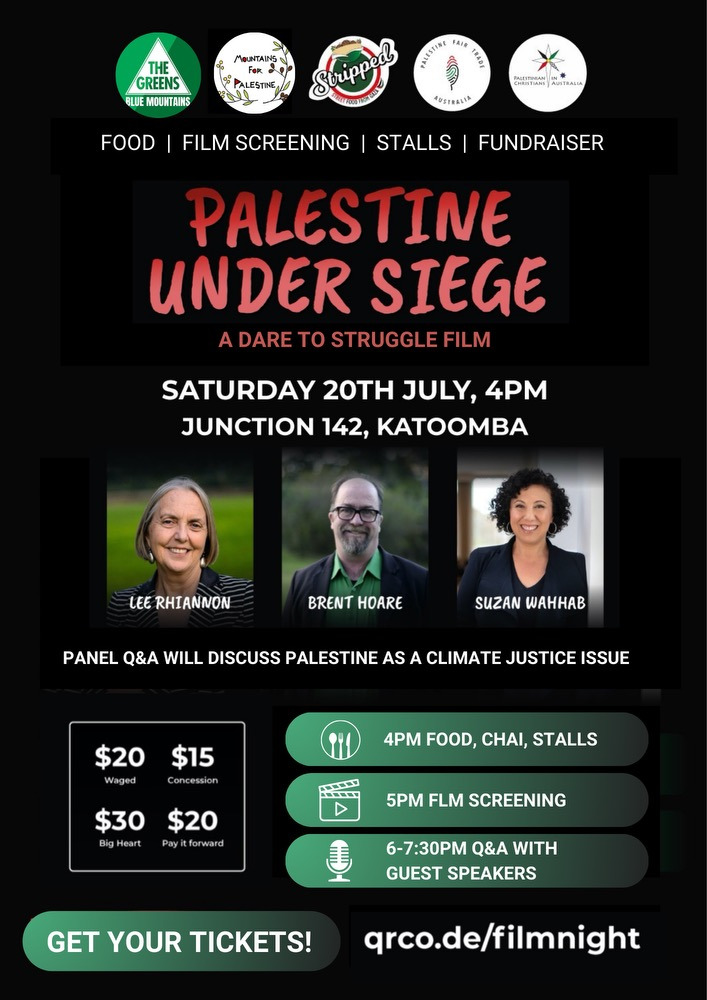

Tuesday 6 August 6.30pm
Public Meeting in Sydney
Organised by Mobilise Against AUKUS & War
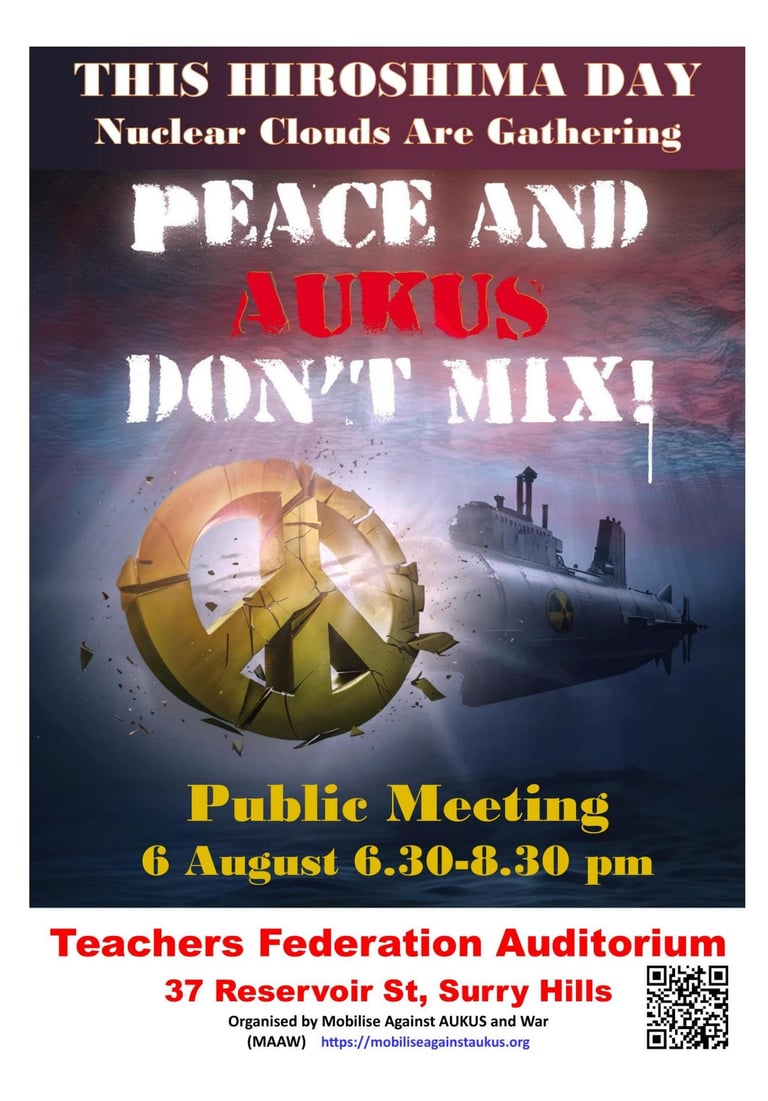

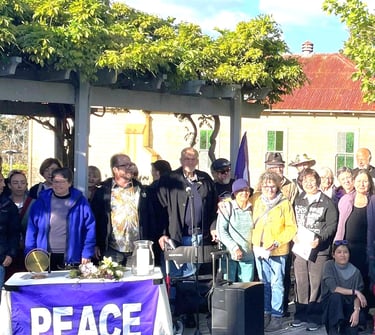

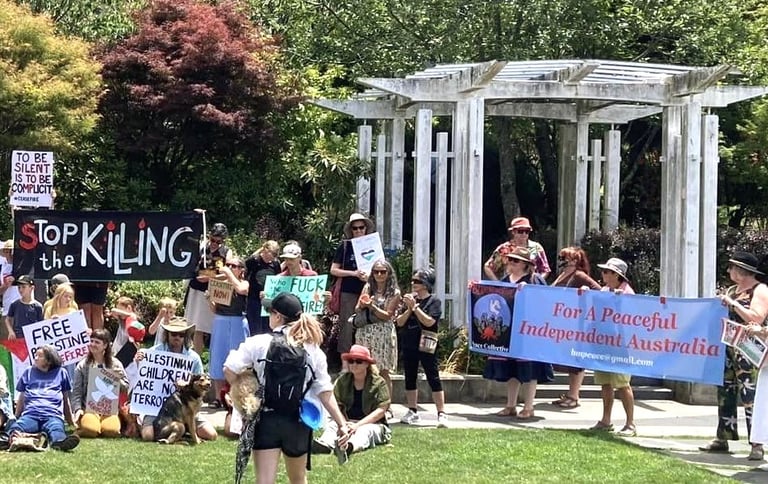



Our call for a Ceasefire in Gaza saw 50 people join a vigil in Peace Park at Civic Place opposite the Council chambers in Katoomba on October 18. People of faith and other local activists spoke.
A Peace Collective member spoke about peace requiring an end to injustice, not just an end to hostilities. There will be no peace without justice for Palestinians suffering deprivation, dispossession and tyranny under Israeli occupation and land seizure. We call for Peace and Justice in the Middle East.
Previous Local Peace & Justice Events
Ceasefire For Gaza
We continue to organise and join other action against the slaughter in Gaza, the genocidal bombardment and invasion, the blockade depriving people of the basic needs, food, water, medicine and care, and the war driving people already in exile further from their ancestral homes.
We organised a vigil with members of faith communities in the Blue Mountains on October 18 and joined protests at Katoomba's old Library on Nov 12. 19 and 26, as well as members joining protests in Sydney, at the Town Hall and Hyde Park through October and November.
We organised over 120 local people, including 20 artists and performers, the current and former mayors and a few councillors, with other local organisations, to sign an open letter to the Australian Government and our local community which was published in the local weekly newspaper on 6 December 2023. It was sent to our local Federal MP Susan Templeman for her to bring to the government. The government changed its UN vote and voted for an immediate Ceasefire in Gaza a week later.
Vigil for Middle East Ceasefire
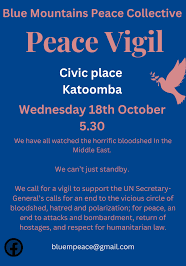

AUKUS & the UN Treaty to Ban Nuclear Weapons
In September 2023, our initial public event targetted the Australian Government's commitment of $368 billion to the AUKUS pact and its failure to sign the UN treaty to ban nuclear weapons.
AUKUS commits Australia to buy 8 nuclear-powered submarines, to harbour US and UK nuclear-powered submarines in our ports, station nuclear weapons-capable US strategic bombers and thousands of US marines in our north, and lock our universities and technology institutions into US and UK war industries.
The Australian government has failed to sign the UN treaty to ban nuclear weapons despite 69 other countries already signing up. Nuclear weapons are the most destructive, inhumane, indiscriminate weapons ever invented.
US China rivalry casts a pall over Australia's future. Australia is being dragged towards another war to protect US dominance of the globe, politically, militarily and economically.
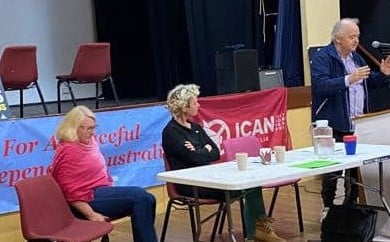

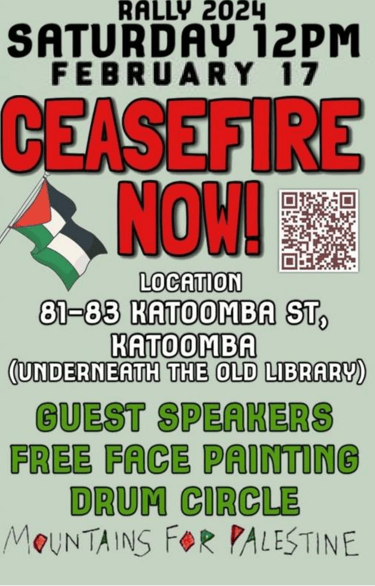

Katoomba Rally for a Free Palestine and Ceasefire November 2023
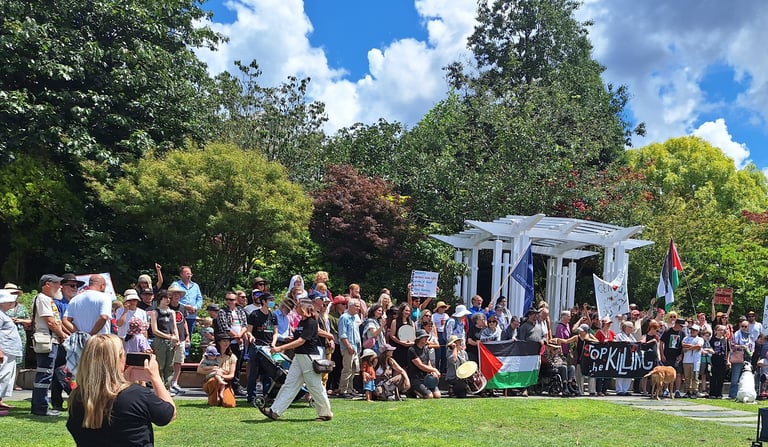

Sydney Rally for a Ceasefire and Justice for Palestine in 2023
Katoomba Rally for immediate Gaza Ceasefire, restore Australian Funding to UNWRA, Israeli withdrawal and Justice for Palestine, 17 February 2024
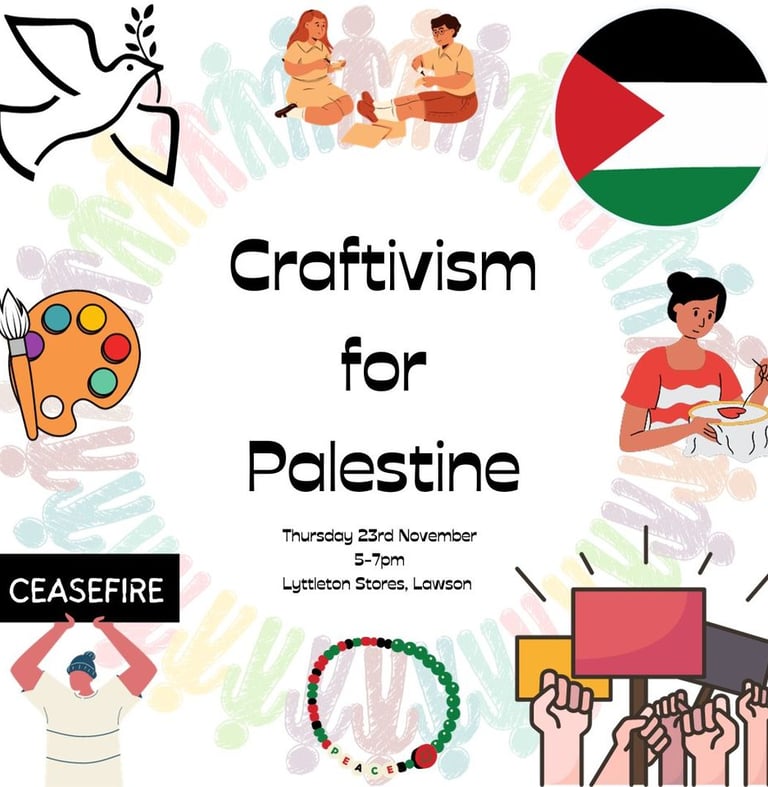

AUKUS hunts War Technology: Isolating Aust Science
But it’s not as bad as it was. The Senate inquiry comes at the end of long discussions and the research establishment has already extracted concessions, including an HE working group to align export controls with those that apply to US and UK universities.
However, Lobbies are still trying to have controls reduced, on the general principle that a Senate inquiry is too good a platform not to use.
Some are ambitious, like the Australian Technology Network’s call for an exemption for basic scientific research – it could be hard to define where bench-work stops and battlefield development starts, although the Group of Eight suggests a distinction, work that would normally be published and research with results restricted for “proprietary reasons”.
However, learned academies (technology and engineering, science) see an opportunity, saying the Bill will require new government-funded research institutions, in a middle space between universities conducting open research and defence projects, and that “It should not and cannot be the responsibility of universities and research institutes to fund the creation of secure or restricted research and development environments.”QUT, wise in the ways Defence works, makes a practical case for changing the Bill’s rules on issuing research permits for projects ex-AUKUS, “consultations with the Department of Defence haveproduced the clear impression that the very substantial prospective demand for permits under the proposed regime is radically underestimated by the government.”
And the Australian Strategic Policy Institute (third funded by DoD) nails it. “To the degree that exceptions, carve-outs and special cases complicate compliance for Australian small and medium enterprises, benefits from the reform will rapidly diminish.”
The Committee is set to report end April.

Sharing defence research: there’s AUKUS and everybody else
• By Stephen Matchett February 14, 2024
The Defence Trade Controls Amendment Bill 2023 is with the Senate Foreign Affairs, Defence and Trade Legislation Committee. Defence Minister Richard Marles says the Bill “will unlock billions of dollars in investment and cut red tape.”
It might with the US and UK submarine partners, but not so much anybody else. The intent is to exempt goods and services on the defence list going to the UK and US from having permits, which are needed elsewhere.
The Senate inquiry has provided researchers unhappy with the Bill with a new opportunity to campaign against the Department of Defence, which always appears keen to expand oversight of research on its patch. In 2018, DoD’s original ambit for a rewrite of the Defence Trade Control Act included an amendment “to allow the Australian Government to more effectively control access to Defence and Strategic Goods List technology and other technology that may be used to prejudice the security, defence or international relations of Australia.”
And now the proposed all-but AUKUS exclusion zone worries universities and research lobbies, which argue the new rules will make it harder to work with the rest of the world – sharing research in tech fields requiring an export licence.
News & Information
Get Involved
Get on our email list
Contact us at
0409 830 734
Copyright (c) 2023 Blue Mountains Peace Collective
Follow us on
@ blue-mountains-peace-collective
The Blue Mountains Peace Collective recognises and pays respect to Dharug and Gundungarra Traditional Owners of the Blue Mountains. They have a continuous, deep and never ceded connection to their Ngurra (Nura) or Country. We pay our respects to the Country and to Elders past, present and emerging while recognising the strength, capacity, resilience and resistance of past and present Aboriginal and Torres Strait Islander people in the Blue Mountains region.
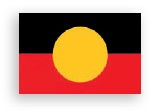

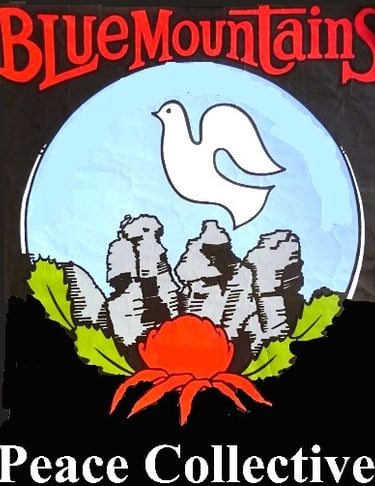

Share this website
